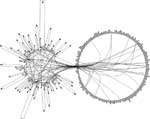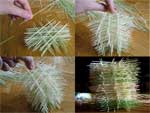Guanxi
A safety net of personal relations in the transnational Chinese community
The meaning of the Chinese word "guanxi" [kwan-si] is "relationship." In traditional Chinese society, two persons may establish a long-lasting, dynamic, personal relationship through an informal network, and their guanxi can be deep or superficial, close or distant, harmonic or tense. Guanxi not only describes this state, but can also be used for the self-definition of a group ("our guanxi") or the identification of an individual ("he is my guanxi"). Building and maintaining relationships through the traditional means of guanxi requires compliance with certain norms of behaviour, which rely on mutual trust and commitment, a general concord, assistance and reciprocity, as well as loyalty. Very important in other societies as well, networking in the Chinese communities is unique in that it simultaneously provides access to social, economic and political networks.
Blood relationship is the strongest bond in this mutual social network. Descent from a common ancestor is the source of strong attachment between members of an extended family, numbering sometimes as many as a hundred persons. Friendship is a less intensive form of relationship, as far as the guanxi is concerned, and even less significant is the tie between acquaintances and colleagues. Formerly it was common for friends to adopt each other as brothers or sisters, or for the older friend to adopt the younger as his son, to strengthen their ties in the guanxi. This could also serve practical purposes of inheritance, and meant a formal joining of interests. The new bonds were tied in a ceremony, recorded on paper, and celebrated with a feast.
The family is the absolute centre of Chinese culture, and it is important to belong to one, even at the price of giving up one's individual aspirations, because this is what provides a safety net of relationships, substantial support that is all the more crucial as there is, to this day, no system of social security in the People's Republic of China. Brought up on Confucian principles, family members move at ease within the networks defined by authority and respect, relinquish their rights for the benefit of the community, respect order, strive for consensus and avoid confrontation. Thus, not only the community, but also the family is home to hierarchic positions. It is thanks to this system of commitment and trust that those who came to Hungary were often those who were considered the most able or resourceful in their families or villages (sometimes a single clan inhabits a village), which then financed their travel and the launch of their business. They have quite a long time to repay the loan (not paying would mean losing the trust and access to the guanxi), and they might even create jobs back home, when their villages produce the goods they sell in their new home. The next step is often to provide support for further family members who want to come here and settle.
While it is natural to be loyal towards family members and friends, there is little inclination to form spontaneous groups. Clans in the motherland rarely make alliances, and this is also true of the community living in Hungary, where families sometimes consider each other competition. For twenty years, the Hungarian Chinese community has been unable to establish an organisation that would represent their interests, and this large group coheres only along a shared "Asian consciousness." Spiritually, they feel tied to the motherland (they plan to return, and most of them remain citizens of China), and until they return or move on to another country, they maintain and extend their guanxi, and produce social capital. A prosperous community can turn its social capital into financial capital, with distance not necessarily an obstacle to this process, as in a Chinese community with transnational links, goods, capital and labour can be quickly mobilised.
Easier to mobilise than other forms of social environments, the guanxi is a special content that is not the personal property of those who benefit from it. With it, the migrant community of the Chinese, who traditionally do not have a stable, institutionalised social environment, introduced stable values into a position of instability. The organising principles of their culture helped them develop creative coordinational skills, which in this dynamically changing world is a lasting value, created by a contemporary community.
Recognising the emotional effect of these organising principles, I experimented with spatial structures I made from materials that are constituted of palpable and emotive elements, to create stable but dynamic systems.
To make this reference to the experiment more comprehensible, I must briefly outline Indra Kagis McEwen's essay, Socrates' Ancestor . Exploring the beginnings of architecture, Kagis also discusses the rectangular matrix that defined the structure of Ancient Greek cities in the colonies, despite the rugged features of the land. She argues that this was not the result of conscious planning, trying to confirm to an imaginary bird's-eye view, but had chiefly emotional motivations. The builders of the towns in question were traditionally good weavers, and what they considered a source of security, what defended their bodies from the environment, was good textile, in which the yarns intersect at right angles. Kagis thinks it was this emotional attachment to a structure that led to the development of architectural solutions we use to this day. A logical follow-up of this argument is the question of what type of architectural structure would provide individuals who are mobile and of multiple identities, but find their personal protection in their networks of personal relations, with the sense of security once provided by textile.
Works consulted:
http://en.wikipedia.org/wiki/Guanxi
Klára Mészáros: "A 'Nagyobb Kína' mint a XXI. század meghatározó gazdasági és politikai ereje" ('Greater China' as a dominant economic and political force of the 21st century). Magyar Tudomány, 2001:9.
Pál Nyíri: "Egyén és közösség: kínai társadalmi szervezetek Magyarországon, 1989-1995" (The Individual and the Community: Chinese public organisations in Hungary, 1989-1995), In: Táborlakók, diszpórák, politikák, MTA Politikai Tudományok Intézete Nemzetközi Migráció kutatócsoport Évkönyve, 1995. Budapest, 1996, 130-138.
Robert D. Putnam: "A prosperáló közösség. A társadalmi tőke és közérzet" (The Prosperous Community: Social capital and public mood). Parola, 2004:3.
Indra Kagis McEwen: Socrates' Ancestor. An Essay on Architectural Beginnings. MIT Press, 1997.
Anita Pozna
|

The relationships of members
of the Chinese community with each other, the Vietnamese and the outside world, in the largest online community in Hungary (iWiW)

Triangle lattice from Chinese noodles

Lattice from silicon toys bought
on the Chinese market |